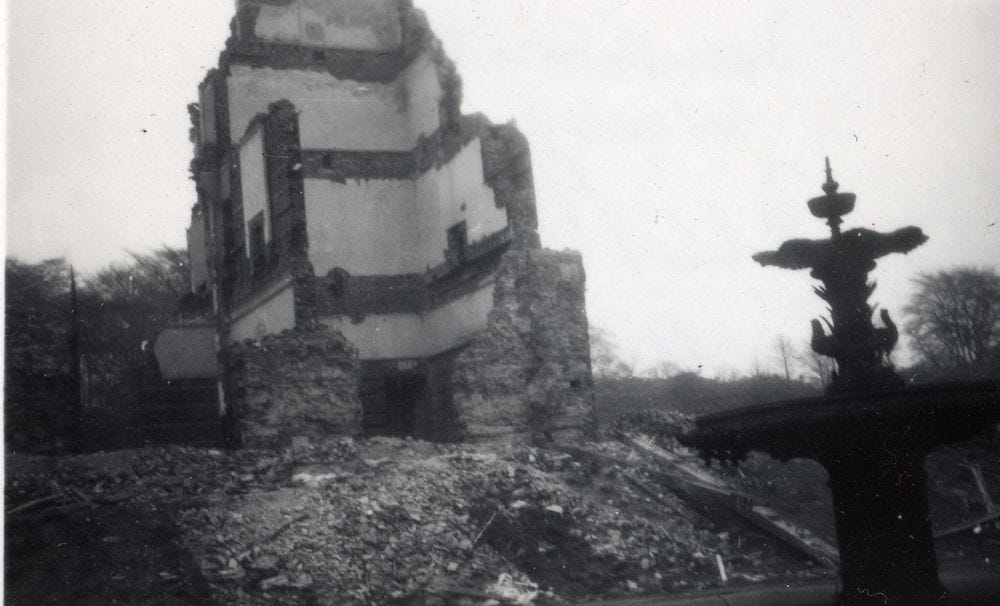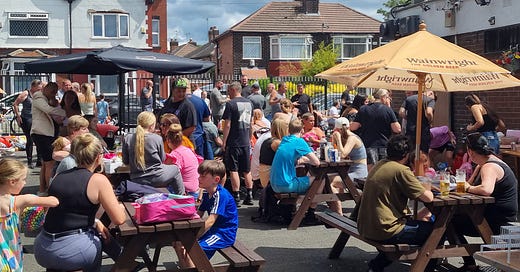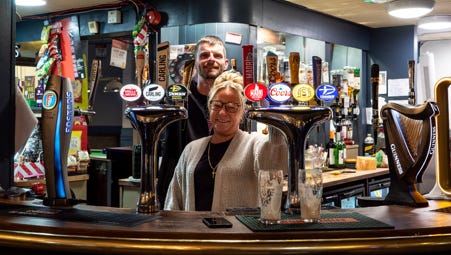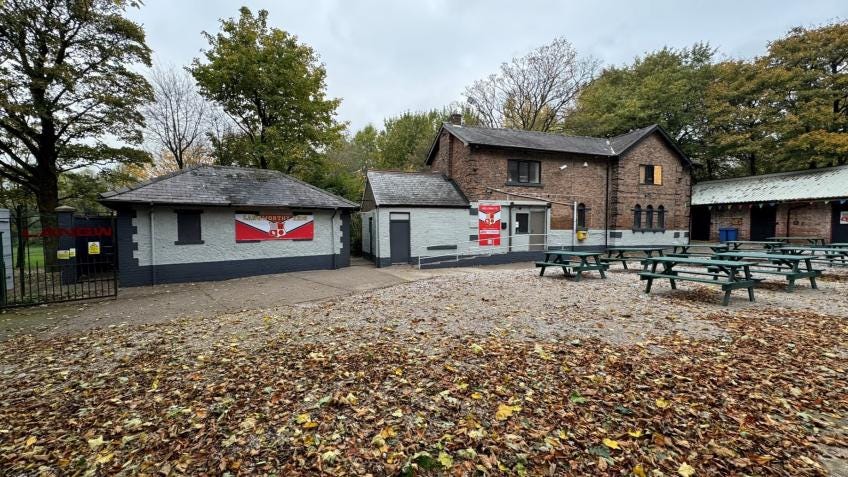Can Salford’s pubs survive in a time of change?
Pubs were stages for the small, vital dramas of everyday life. Yet, across Salford, these bastions of community are vanishing.
In this week’s newsletter, we look at the city’s pubs and their contrasting fortunes.
The newsletter will also look at a Salford rugby league club’s fundraiser to repair club house, the Eccles social club aiming to fight loneliness and Jamie Laing set to finish his ultra-marathon challenge in MediaCity for Red Nose Day.
If you enjoyed it please forward this newsletter to someone who might enjoy it. Got a tip? Let us know at Now@Salford.ac.uk
A pint of history
The worn brass door handles of Salford’s pubs once gleamed with use, swung open by daily workers, students, and families. Now, many of those doors are locked for good, their paint peeling and windows gathering dust. The steady hum of chatter that once spilled out onto the streets is now replaced by silence. HMOs, takeaways, and barber’s shops stand where Salford’s pubs once were. The question looms: what is happening to Salford’s pubs, and with them, a piece of its heart?
For generations, these establishments were more than watering holes — they were sanctuaries for community. From Sunday roasts and midweek quizzes to the clinking of glasses after a hard day’s work, pubs were stages for the small, vital dramas of everyday life. Yet, across Salford, these bastions of community are vanishing.
“We’ve got another five years of it,” Donna Roberts admits, almost sorrowfully. Entering the Dutton Arms in Eccles feels like stepping into a time capsule. A pub clinging to its regulars like an old friend, the decline of public drinking is felt keenly.
“I class us as an old backstreet boozer,” says Donna. Looking around, from the fireplace keeping patrons warm and the free pool keeping the regulars entertained, it does look just that. Donna flits easily between talking to us and asking a customer if they fancy another of their usual.
Sitting at a table in the corner nursing a pint of Fosters is Tony Shelmerdine, better known by Donna as ‘Grumpy Tony.’ Coming in daily, he’s been drinking at The Dutton Arms for years. “Cozy, familiar, comfortable,” are the three words he uses to sum up the pub. People like Tony are the people who would lose a big chunk of their community if the pub were to close. “That's why I think it'll be the biggest shame when these places start to close” Donna said. “Builders don’t see this when they’ll looking at knocking it down, they don’t see what the pub entails.”
At the Weaste & Seedley Social Club, one of the city’s success stories, a sense of nostalgia mingles with resilience. A place that's moved with the times, it’s seen that its focus on bringing people together, offering affordable drinks and entertainment has allowed them to stay strong. However, Ian Carberry, the club's secretary, acknowledges the uphill battle.
“Salford's pub scene has been through some tough times in recent years,” he concedes. “Times have changed. Young people now have more entertainment options.”
Having discussed it with pub owners, I took my questions to the community. A lot of people shared their favourite pubs, telling me with excitement about how their place is a taste of what Salford used to be like. However, some also told me that things have changed too much, from a lack of atmosphere to the price of alcohol.
Across the city, stories like this are all too common. Declining footfall, rising overheads and the lure of cheap supermarket booze have forced many to shut their doors. But it isn’t just economics that’s driving the change. Health-conscious lifestyles and shifting social habits are also reshaping how Salfordians unwind. “There’s a broader range of things you can do,” Tom Stainer, chief executive of the Campaign For Real Ale (CAMRA) says. “It’s been a cultural shift in where people socialise.”
At first glance, the loss of a pub might seem inconsequential; a shrug worthy casualty of modern life. But the closures reveal something deeper: the erosion of spaces that once served as the glue holding communities together. “You lose that sense of community that you get from a pub once the pub is closed,” adds Tom. “You know it's gone, and it very rarely comes back.
“You also lose a service which is vital to a lot of people in communities, especially those who maybe suffer from loneliness,” says Tom. A CAMRA study found people who had a local pub tended to have more friends as well as having a more fulfilling social life.
Not all hope is lost, however. At The Star Inn in Higher Broughton, the lights are on, the pints are flowing, and the tables are full. When the pub faced closure in 2020, locals rallied to save it. Now community-owned, it thrives as a hub for live music and quiz nights: CAMRA describes it as the ‘first community owned pub in the UK’ boasting a ‘pub interior of very special national historic interest.’ Sitting with the regulars you can see the relaxation on their faces after a hard day week. ‘More than just a pub,’ a ‘second home’ is how punters describe The Star.
Mark, a regular, tells me to me about how his local impacts his life. “It was where you went if you were happy or sad, lonely or celebrating,” he says. “It gets me out of the house.” And this sentiment rings true to so many others who found their sense of belonging within these bricks and mortar.
Still, the numbers don’t lie. Across the UK, 289 pubs closed in 2024, with some of Salford’s own falling victim to this trend. Beyond economic and social challenges lies a sense of inevitability for some. Streets that where once bustling with pubs now stands quiet, save for a few stubborn survivors.
“They stand as good a chance as any business surviving,” claims Tom Stainer. “I'm positive about that. Most community pubs just need to think about, okay, what does this generation of customers need?” Pubs find ways to adapt. Pop-up beer festivals, craft ale menus, and micro-pubs are offering glimmers of hope for an industry that feels like it’s teetering on the edge of extinction. As Salford evolves, the pub will also have to evolve to continue to find a foothold in this new chapter.
What is certain, though, is that every shut door and boarded-up window represents more than just a business lost. It’s a small fracture in the fabric of Salford’s identity, a reminder that even the sturdiest traditions can falter without the right support.
Salford rugby league club Langworthy Reds raising cash for clubhouse repairs
A Salford rugby league club have set up a crowdfunding project to help repair their clubhouse that has been apart of the community for over 140 years.
Langworthy Reds have launched the fundraiser to make urgent repairs to their clubhouse, including updates to the roof, new windows and new doors.
The club is making the repairs to ensure that it will become more accommodating to fans and visitors of the team. Read more here.
Eccles social club fighting loneliness left disappointed after no-one attends first meeting
The organisers of a new exclusive social club for over 60s in Eccles are hoping to spread the word after no-one attended their inaugural event.
The club located in Transcend studios offers the perfect opportunity for over 60’s to socialise and enjoy company with like-minded people, whilst also enjoying a fresh slice of cake with a tea or coffee. Read more here
Jamie Laing’s five-day charity ultra-marathon to finish in MediaCity
BBC Radio 1 presenter Jamie Laing has said he will “crawl over the finish line” at MediaCity if he must to finish his charity ultra-marathon.
The broadcaster and former Made In Chelsea star set off this morning (Monday 17 March) and will take on a 150-plus mile run from London to Salford to raise money for Comic Relief. Read more here.
What’s On in Salford this week
🎭 Handbagged, based on meetings between Queen Elizabeth II and Margaret Thatcher, has been reimagined with music, featuring reworkings of 80s pop classics. The show will be on a national UK tour, but will be stopping at the Lowry stage from March 18 to 22 2025. Find out more here.
🎨 A new immersive art gallery is set to open in MediaCity that will aim to bring portraits to life through storytelling. Unframed will bring portraits to life from May 2, 2025, as they aim to ‘unframe and bring the portrait to life.’ Find out more here.
🔴 Red Nose Day Live in MediaCityUK in Salford - the charity fundraiser will be held in Salford with schools, businesses, and individuals all taking part across the city to raise money tonight.
Our photo of the week: Demolition of Worsley New Hall 1948

Worsley New Hall was built for the 1st Earl of Ellesmere between 1840 and 1845.
The Gothic-style mansion was described in A Guide to Worsley: Historical and Topographical (1870) as 'comparable with any of the mansions of the nobility in the north of England; it is an ornament to the county in which it stands.'
In 1944 tenders were put out for the demolition of the New Hall and it was eventually sold to Sydney Littler, a scrap merchant from Ashton in Makerfield for £2,500 - with the demolition beginning in 1946.
By 1949, just over 100 years after it had been built, the Hall was completely demolished. 800 tons of the Hall’s stonework was transported to Yorkshire and used in the construction of council houses in Southfield, Heptonstall.
Thank you for reading
All our journalism is written by people working, studying and living in Salford – for the people of Salford. We'll be adding more exclusive writing to future editions. If you value local journalism sign up: it’s free, easy and we’ll never share your data.







I truly hope they can
Love my city ❤️